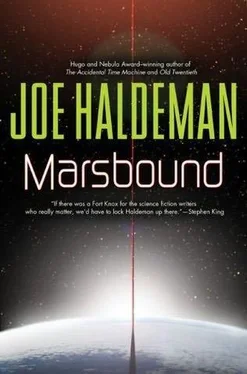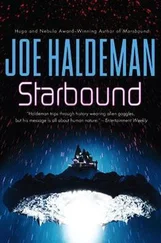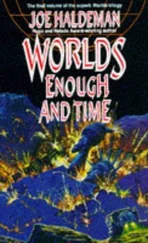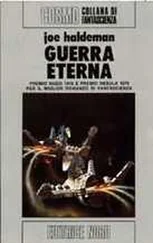“No… she heard me say that we got the message, and ‘please don’t kill us’—she can extrapolate a lot from that.”
Red nodded. “Merely mortal danger.”
I tried to keep my voice down. “The only thing we have on her is the fact that she broke the law making that recording.”
“There is also the fact that she apparently has little beyond that one phrase.”
I thought back to what she’d said. “True. Little enough. She didn’t seem to know that you had decoded the FM message. ‘We got the message’ could refer to the Drake diagram thing. As far as she knows, we were conspiring to communicate with the enemy in English.”
He paused. “Until we learn differently, then, let’s make that a working hypothesis: she thinks we don’t have any more data than anyone else. Meanwhile, we enlist Fly-in-Amber and Paul, swearing them to absolute secrecy.
“When the Other responds to Earth’s overtures, we’ll decide on our own course of action.”
“And if it doesn’t respond? How long do we wait before we try to contact it ourselves?”
“If it moves at one-eighth my speed, I’d say a week. Of course, it might have various responses prepared ahead of time.”
“Like destroying everything?”
“No. If it were that simple, there would have been no need for the message it sent to Fly-in-Amber. We’re safe for the time being.”
“Which could be hundreds or thousands of years.”
“Yes. As long as we don’t do anything that threatens it, or the Others back home. Or it could be hours or days.” Red made his humanlike shrug.
My timer’s buzz was barely audible over the festive jazz, Dixieland gone to Chicago a couple of centuries ago. “That’s the ten-minute warning. Guess we better go up and watch them push the button.”
Just about everybody, human and Martian, showed up for the ceremony. One wall of Earth A was glass and shared by its counterpart on the other side of the quarantine. We had more room per person, or entity, but they had champagne.
After the short speeches and button-pushing, the screen showed a roster for interviews at the two VR sites. Paul and I were scheduled first, though with two different interviewers. Paul had a guy from an MIT technical journal. I was stuck with Davie Lewitt, who was pretty and intense but not remarkably intelligent. She had interviewed me after the Great Hairball Orgy on Mars, and pinned the name “The Mars Girl” on me. For a couple of years, it was “hey, Mars Girl,” whenever someone wanted to annoy me.
I was only a little sarcastic with her during the hour, but Dargo, who had been watching, gave me an annoyed grimace when she took over the helmet. She used more disinfectant spray than was necessary. But Oz gave me a broad smile and a thumbs-up.
When Paul came out I touched his arm and cut my eyes in the direction of my room. He smiled, but wasn’t going to get quite what he expected.
You don’t use paper wastefully in space. But it’s one way to write something down and know that no electronic snoop can sneak a copy. As soon as we entered my door, I handed him the folded-over sheet that started KEEP TALKING—DARGO’S LISTENING! Underneath that was a summary of everything Red had told me about the frequency-modulation message, and our tentative plan.
We chatted, mostly me talking, about our VR interviews. We undressed and I called for music, an obscure whining neoromantic guitar/theramin collage by some Finnish group whose name I couldn’t even read. But it was loud.
When he finished reading, we got into bed and made appropriate sounds while whispering under the music.
He nuzzled my ear. “So we do nothing until the Other responds. Then Red—and you and I and Fly-in-Amber—will send them back a message. In Red’s language.”
“Right. Can you build a radio transmitter?”
“We already have one that’s rarely used. We could point it at Neptune and talk away.”
“I don’t think that would be safe.”
“Probably not, if she’s being fanatically thorough. But we don’t have an electronics lab on this side. You can’t build anything without parts.”
“So couldn’t the existing radio have a little accident? It’s got all the parts.”
“God, you’re a devious woman.”
“Is it possible?”
“Yes, of course. I’ll study the wiring and be ready to disable it. In the course of testing the ‘repairs,’ I’ll send this gibberish out toward Neptune.
“But there’s one thing you and Red missed. Dargo doesn’t have to be that afraid of punishment, when she admits to having spied on you. What can they do—extradite her to Earth? Dock her pay? There’s nothing to buy here, and we’re already in a kind of prison.”
“Well, Oz, and probably the others, would help us pressure to have her relieved of responsibilities. Deny computer access.”
“That could work. Make her stare at the walls until she begs to be thrown out the air lock.”
“I like the way you think.” I straddled him. “The music’s going to climax in about two minutes.”
“Slave driver.” But he managed a coda.
Allowing for speed-of-light travel time, the Other took only twenty-some minutes to react to the Drake message—which meant that most of the response must have been prepared ahead of time, and it only had to choose which button to push.
If, that is, it had been honest with Red when it described its temporal limitations. It did occur to me that there was no compelling reason for it to tell us the truth.
Or to lie, if it was as powerful as it claimed.
The answer to the message came in spoken English, in an odd American accent, which Earth quickly identified as David Brinkley’s, a newscaster from a century ago:
“Peace is a good sentiment.
“Your assumption about my body chemistry is clever but wrong. I will tell you more later.
“At this time I do not wish to tell you where my people live.”
Then it began a speech in a slightly different tone, a speech that could have been prepared years ahead of time:
“I have been watching your development for a long time, mostly through radio and television. If you take an objective view of human behavior since the early twentieth century, you can understand why I must approach you with caution.
“I apologize for having destroyed your Triton probe back in 2044. I didn’t want you to know exactly where I am on this world.
“If you send another probe, I will do the same thing, again with apologies.
“For reasons that may become apparent soon, I don’t wish to communicate with you directly. The biological constructs that live below the surface of Mars were created thousands of years ago, with the sole purpose of eventually talking to you and, at the right time, serving as a conduit through which I could reveal my existence.
“‘Our’ existence, actually, since we have millions of individuals elsewhere. On our home planet and watching other planets, like yours.”
Then it said something that I thought would simplify our lives, at least mine and Red’s. “This is a clumsy and limited language for me, as are all human languages. The Martian ones were created for communication between you and me, and from now on I would like to utilize the most complex of those Martian languages, which is used by only one individual, the leader you call Red.” Then it went into about two minutes of low, gravelly wheedly-rasp-poot, and went silent.
“So what was that?” Dargo said.
Red favored her with a potato stare. “Please play it back for me.”
He listened. “Can you speed it up by a factor of eight or so?”
“No problem,” a voice said from the screen. “Just give me a minute. I can double the speed three times.”
Читать дальше












